 W
WDefensins are small cysteine-rich cationic proteins across cellular life, including vertebrate and invertebrate animals, plants, and fungi. They are host defense peptides, with members displaying either direct antimicrobial activity, immune signalling activities, or both. They are variously active against bacteria, fungi and many enveloped and nonenveloped viruses. They are typically 18-45 amino acids in length, with three or four highly conserved disulphide bonds.
 W
WAlpha defensins are a family of mammalian defensin peptides of the alpha subfamily. In mammals they are also known as cryptdins and are produced within the small bowel. Cryptdin is a portmanteau of crypt and defensin.
 W
WArthropod defensins are a family of mollusk, insect, and arachnid cysteine-rich antibacterial peptides, primarily active against Gram-positive bacteria and fungi in vitro. However Drosophila fruit flies mutant for the fly defensin were more susceptible to infection by the Gram-negative bacteria Providencia burhodogranariea, and resisted infection against Gram-positive bacteria like wild-type flies. It remains to be seen how in vitro activity relates to in vivo function. Mutants for the defensin-like antimicrobial peptide Drosomycin were more susceptible to fungi, validating a role for defensin-like peptides in anti-fungal defence.
 W
WBeta defensins are a family of mammalian defensins. The beta defensins are antimicrobial peptides implicated in the resistance of epithelial surfaces to microbial colonization.
 W
WBeta-defensin 1 is a protein that in humans is encoded by the DEFB1 gene.
 W
WBeta-defensin 2 (BD-2) also known as skin-antimicrobial peptide 1 (SAP1) is a peptide that in humans is encoded by the DEFB4 gene.
 W
WDefensin, alpha 1 also known as human alpha defensin 1, human neutrophil peptide 1 (HNP-1) or neutrophil defensin 1 is a human protein that is encoded by the DEFA1 gene. Human alpha defensin 1 belongs to the alpha defensin family of antimicrobial peptides.
 W
WDefensin, alpha 1B a human protein that is encoded by the DEFA1B gene.
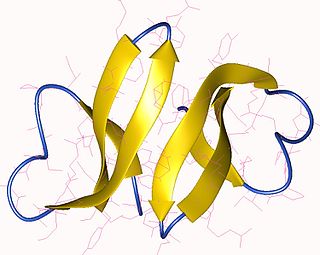 W
WDefensin, alpha 3 (DEFA3) also known as human alpha defensin 3, human neutrophil peptide 3 (HNP-3) or neutrophil defensin 3 is a human protein that is encoded by the DEFA3 gene. Human alpha defensin 3 belongs to the alpha defensin family of antimicrobial peptides.
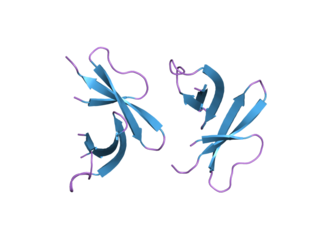 W
WDefensin, alpha 4 (DEFA4), also known as neutrophil defensin 4 or HNP4, is a human defensin peptide that is encoded by the DEFA4 gene. HNP4 is expressed in the granules of the neutrophil where it defends the host against bacteria and viruses.
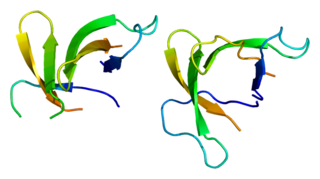 W
WDefensin, alpha 5 (DEFA5) also known as human alpha defensin 5 (HD5) is a human protein that is encoded by the DEFA5 gene. DEFA5 is expressed in the Paneth cells of the ileum.
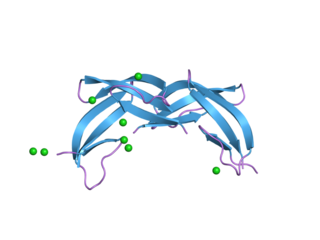 W
WDefensin, alpha 6 (DEFA6) also known as human alpha defensin 6 (HD6) is a human protein that is encoded by the DEFA6 gene. DEFA6 is expressed in the Paneth cells of the ileum.
 W
WBeta-defensin 103 is a protein that in humans is encoded by the DEFB103A gene.
 W
WBeta-defensin 104 is a protein that in humans is encoded by the DEFB104A gene.
 W
WBeta-defensin 105 is a protein that is encoded by the DEFB105A gene in humans.
 W
WBeta-defensin 106 is a protein that in humans is encoded by the DEFB106A gene.
 W
WBeta-defensin 118 is a protein that in humans is encoded by the DEFB118 gene.
 W
WBeta-defensin 119 is a protein that in humans is encoded by the DEFB119 gene.
 W
WBeta-defensin 127 is a protein that in humans is encoded by the DEFB127 gene.
 W
WDrosomycin is an antifungal peptide from Drosophila melanogaster and was the first antifungal peptide isolated from insects. Drosomycin is induced by infection by the Toll signalling pathway, while expression in surface epithelia like the respiratory tract is instead controlled by the immune deficiency pathway (Imd). This means that drosomycin, alongside other antimicrobial peptides (AMPs) such as cecropins, diptericin, drosocin, metchnikowin and attacin, serves as a first line defence upon septic injury. However drosomycin is also expressed constitutively to a lesser extent in different tissues and throughout development.
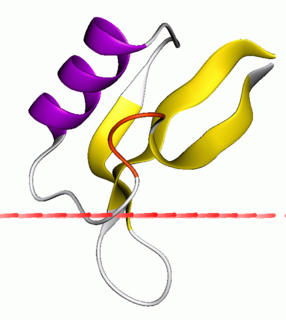 W
WPlant defensins are a family of small, cysteine-rich proteins found in plants that serve to defend them against parasites.